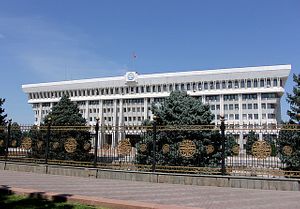Kyrgyzstan’s most prominent political party, the Social Democratic Party, met May 17 and decided on a nominee to run in the presidential election this fall. The party’s nominee — Sooronbay Jeenbekov — has served as prime minister since April 2016. He joins a growing field of candidates for an election which will be closely watched as a marker of the country’s democratic progress.
Jeenbekov is described by regional analysts as an Atambayev loyalist and part of a bloc of influential southern politicians. Before becoming prime minister, Jeenbekov served as a deputy head of the presidential administration and notably was governor of the Osh region in the years following the 2010 revolution. Sooronbay Jeenbekov’s brother, Asylbek Jeenbekov, had held the post of parliament speaker until Sooronbay’s appointment as prime minister.
SDPK is largely associated with current Kyrgyz President Almazbek Atambayev, though officially he suspended his membership in the party when taking office (per the country’s Constitution) in 2011. SDPK, which holds the most seats in parliament (38), heads the ruling coalition but is far from the country’s only political party of note.
Jeenbekov’s nomination would seem to settle some of the rumors swirling already about Atambayev’s post-term ambitions, though by no means does it settle them all. Some wondered whether he would find a way to run for the presidency again, a common theme in other Central Asian states. A more realistic concern is if (and if so, how) Atambayev could seek to influence the election and the next president. Atambayev’s critics say he may find a way into either the prime minister’s post, ala Putin and Medvedev, or into an eminence grise-like position with influence over a political ally. Atambayev at one point said he would exit politics when his term was finished, but in more recent comments has said he’d remain in the game.
Jeenbekov joins a growing list of Kyrgyz politicians throwing their hats in the ring. Most notable among the contenders to date are Temir Sariyev, Jeenbekov’s immediate predecessor as prime minister who left office last year amid a swirl of corruption accusations; Bakyt Torobayev, head of the Onuguu-Progress party, which broke with the SDPK’s ruling coalition last year during the hullabaloo over the constitutional referendum; and then there is Omurbek Tekebayev, the leader of the Ata-Meken party, who was arrested in February, kicking off protests.
The biggest challenge to SDPK and Jeenbekov, however, would seem to be Omurbek Babanov, a prominent and respected northern politician — setting up the possibility of a regionalized clash. Babanov was nominated earlier this year by Respublika-Ata-Jurt, the country’s second-largest party. Respublika-Ata-Jurt holds 28 seats in parliament and in a recent public opinion poll, Babanov was highly regarded. When asked to name three politicians or public figures they trusted, 35 percent of respondents said Babanov, beating out Atambayev at 31 percent. When asked their opinion of various political figures by name, 80 percent of respondents gave Babanov a favorable rating; Atambayev got 82 percent favorable. Jeenbekov, however, only had a 45 percent favorable rating — with 19 percent of respondents replying they hadn’t heard of him.
One more, albeit technical, question remains: when will the election be held? Throughout 2016, commentators (myself included) pegged the election to October. Then parliament decided to set a November date. That has become a controversy of sorts and the same day Jeenbekov was nominated, parliament passed the second reading of a bill to reschedule the election to October.































